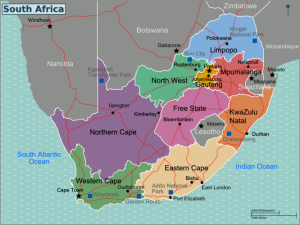By Sarah-Claire Jordan
 South Africa is a country with very interesting origins, from its settlement by the Dutch to contact with the Portuguese and finally colonization by the British. Of course, like most other countries, there were already people living in the area before any Europeans arrived, and they add their own flavor to the mix. Immigrants from other countries have settled there as well, adding to the multiethnic makeup of the population.
South Africa is a country with very interesting origins, from its settlement by the Dutch to contact with the Portuguese and finally colonization by the British. Of course, like most other countries, there were already people living in the area before any Europeans arrived, and they add their own flavor to the mix. Immigrants from other countries have settled there as well, adding to the multiethnic makeup of the population.
South Africa may be one of the most ethnically diverse countries in Africa, and this is shown in the constitution, which lists eleven different official languages. Very few people speak a native language that is not listed as one of these eleven official languages. They can be categorized more or less into two groups:
West Germanic Languages of South Africa
As English speakers who know that English is one of the official languages of South Africa, we tend to think that English must be the predominant language. In fact, only 9.6% of the population, according to the 2011 census, speak English as a native language. Many others speak it as a second language, but it’s interesting that the percentage is that low, even a bit encouraging in times when English tends to be viewed as the “best” language to speak, no matter where you’re from.
With 13.5% of the population as native speakers as of 2011, Afrikaans beats out English as the number one West Germanic language in South Africa. Originally, Dutch took the place of Afrikaans as one of the two official languages of South Africa, alongside English. This only lasted from 1910 to 1925, at which point Afrikaans overwhelmed Dutch as a much more popular language, and Dutch was effectively discarded. The Dutch legacy remains, however, in the form of Afrikaans, which evolved from a dialect of Dutch spoken in South Holland.
Bantu Languages of South Africa
As of 1994, nine other languages were recognized as official languages of South Africa, though English remained the official government language. The language recognized were, of course, languages already spoken by a large portion of the population whose ancestors lived in what is now South Africa even before any European contact. All of them are considered Bantu languages, and they can be further divided into two groups: Nguni languages (Xhosa, Swati, Zulu, and Ndebele) and Sotho-Tswana languages (Northern Sotho, Sotho, and Tswana). That leaves two: Venda, which is a Southern Bantu language, and Tsonga which is a Tswa-Ronga language.
Of all of the official languages of South Africa, Zulu is the language that has the most native speakers, followed by Xhosa and then Afrikaans. This says something about the culture of South Africa, that the language of government and the media in general is English, and yet only 9.6% of the population speak it natively. In fact, only 23.1% of the population speaks a non-Bantu language as their first language. Given the statistics, it would make more sense for the language of the government and media to be Zulu. Only about 1.6% of the population speaks something other than those eleven languages as their first language, meaning the cultural diversity of South Africa was established long before it became a country that was attractive to immigrants.
For an overview of our translation expertise, visit our website translation and localization page.



